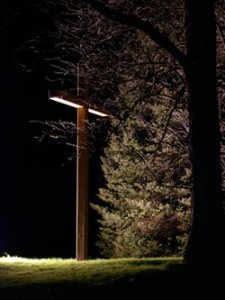My apologies to Walt Disney. I’m shamelessly stealing the idea for this post from  Lisa at Keeping Pace, but I have a different take on it, so bear with me.
Lisa at Keeping Pace, but I have a different take on it, so bear with me.
The Compact O.E.D. Second Edition defines “happy” as, “feeling or showing pleasure or contentment.” Another definition I found states that “happy” connotes a feeling of satisfaction that something has been done well. In my association with St. Procopius Abbey over the last several years, I have had many occasions to feel happy, but never more so than when I attend a wake. This requires a little context.
A few years ago, Father Abbot asked our Oblate Director, to provide oblates to serve as pallbearers whenever one of the monks died. Ostensibly this was because the monks, who as a group, are generally older men, are less able to deal with the physical demands involved. But I also like to think that it was a way of involving oblates more in the life of the community. I have served as a pallbearer on numerous occasions, in fact, as of last night, I have attended 14 funerals at the abbey. It is an honor to serve as a pallbearer, to perform a corporal work of mercy like burying the dead, but it is also a great joy. I think I say it every time that there is no happier event on earth then the funeral of a monk—hang on, give me a minute.
Because we are Christians, we believe that this life is not the end, but a passage to life eternal in the presence of God; the One who made us, who loves us, and wants us to be with Him. No one understands that better than a monk. Their whole consecrated life is one of coming to know the Lord more intimately. It is a life of constant prayer, repentance, and service to others. It is a difficult, sometimes grueling journey of transformation that lasts until your final breath, and few men these days are brave enough to set out upon it. When a monk dies, he has finished that journey. He has completed his task. He has gone home to the Lord. Whatever pain and suffering surrounded him on earth is at an end.
For those who have never experienced a wake at an abbey, let me give you a brief rundown of how it is done at St. Procopius: Everyone gathers in the narthex, the area just inside the abbey but outside the abbey church. The bell tolls and all are silent, then from outside, the pallbearers bring in the coffin. At the same time, the monks, followed by Father Abbot come from the abbey church to meet their deceased brother. Father Abbot prays over the coffin and sprinkles it with holy water, recollecting the deceased’s baptism. All sing a psalm, and then the monks process into the church singing, followed by the coffin, with the family and gathered friends.
Once in the church, the coffin is placed in front of the altar. The undertaker and brother infirmarian open the coffin so that all can view the deceased. The monks take their places in choir, the family and friends find their places. When all are settled, another psalm is sung, followed by a gospel reading, and then the eulogy. The eulogies are, without fail, joyful, often funny, celebrations of the deceased’s virtues, foibles, and monastic life. There are little inside jokes that make the monks chuckle. They are brothers fondly reminiscing about their brother. They are a family more closely knit than any blood kin.
A final psalm is sung, then intentions are offered, after which all pray the Lord’s Prayer. Father Abbot intones the final prayers and then the most touching and poignant part of the ceremony takes place: Father Abbot along with the Master of Ceremonies silently approaches the coffin to have a brief private farewell with the deceased and offer their priestly blessing. After them, the monks, one by one, file down from the choir for their last goodbye, after which they silently leave the church. Then the family makes their goodbyes, followed by the gathered friends. This final leave-taking concluded, and when all have left, the monks begin their watch, praying psalms for their brother, taking turns sitting with his coffin all night long. The next day, the funeral Mass is celebrated and the body is interred in the abbey cemetery.
Yes this is a very happy event. A life well lived has been completed. You cannot witness this without almost hearing our merciful Lord say, “Well done good and faithful servant!” May we all hear those words when our journey is complete.

Having attended many monastic wakes myself (especially serving as pallbearer); without a doubt, you have captured the experience perfectly. Indeed, I wish I was there to celebrate with my confreres.
When the last psalm is song, and as the bell tolls… in the stillness and simplicity and joy and peace; one hand holding fast the bar, whilst we walk in step alongside our brother in Christ, gently carrying him as a mother does a child, we deliver him back to the womb of this earth – from whence we all came.
Rest in peace BC, and may perpetual light shine upon you. We will see each other again, and sing our psalm of rejoicing; only next time in the august presence of our Divine Majesty.
Until then…